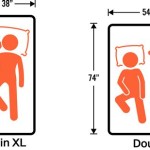Do Bed Bugs Eat Bedding?
Bed bugs are parasitic insects that feed on the blood of humans and animals. While they are often associated with dirty or unsanitary conditions, bed bugs can infest even the cleanest homes. Contrary to popular belief, bed bugs do not actually eat bedding. They are attracted to the warmth and carbon dioxide emitted by their human or animal hosts, and bedding serves as a convenient hiding place for them between feedings.
Bed Bugs Are Primarily Interested in Blood
Bed bugs are hematophagous, meaning that they feed on blood. Their primary food source is human blood, although they can also feed on the blood of pets or other animals. Bed bugs have a piercing-sucking mouthpart that they use to penetrate the skin and draw blood. They are nocturnal feeders, typically feeding at night while their hosts are sleeping. They do not consume other food sources like fabric, dust, or bedding materials.
Bedding Provides Shelter and Hiding Places
While bed bugs do not feed on bedding, they do use it as a shelter and hiding place. Bedding, particularly mattresses, box springs, and pillows, provides ample crevices and folds for bed bugs to hide in during the day. This is because bed bugs are sensitive to light and heat. They prefer to stay hidden during the daylight hours and emerge to feed at night. Bedding also provides a source of warmth for the bed bugs, which helps them to survive and thrive.
Bed Bugs Can Survive for Long Periods Without Feeding
One of the reasons that bed bugs are so difficult to eradicate is that they can survive for long periods without feeding. Adult bed bugs can live for several months without a blood meal. This means that even if you don't see any signs of bed bugs, they may still be present in your home, hiding in bedding or other areas. This also explains why bed bugs can easily infest homes even when they are seemingly clean. They can hitchhike in luggage, clothing, or furniture, and may remain undetected for weeks or even months.
Bed Bugs Can Cause Allergic Reactions
While bed bugs do not eat bedding, their presence can trigger allergic reactions in some individuals. Bed bugs release saliva and feces during feeding, and these substances contain allergens that can irritate the skin and cause symptoms such as itching, redness, and swelling. The bites themselves are typically not painful, but they can become itchy and inflamed as a result of the allergic reaction.
Conclusion: Bed Bugs Prefer Blood over Bedding
In conclusion, bed bugs do not eat bedding. Their primary interest is blood, and they use bedding as a place to hide and shelter. While they do not consume fabrics or other materials, their presence can trigger allergic reactions in some individuals. Understanding the feeding habits and behavior of bed bugs is crucial in effectively combating infestations and preventing their spread.

Bed Bug Fact Sheet
Here Are The Best Ways To Avoid Bed Bugs

How To Treat Bed Bugs In A Comforter Orkin

What Attracts Bed Bugs To Your Home And How Keep Them Out

Bed Bug Bites Pictures Treatment And Prevention

What Attracts Bed Bugs To Your Home And How Keep Them Out

How To Tell If You Have Bed Bugs Plunkett S Pest Control

The Truth About Bed Bugs They Re Not Just Nighttime Pests Bedbugs

Bed Bugs Vs Dust Mites The Family Handyman

How To Know If You Have Bed Bugs Bon Accord
Related Posts







